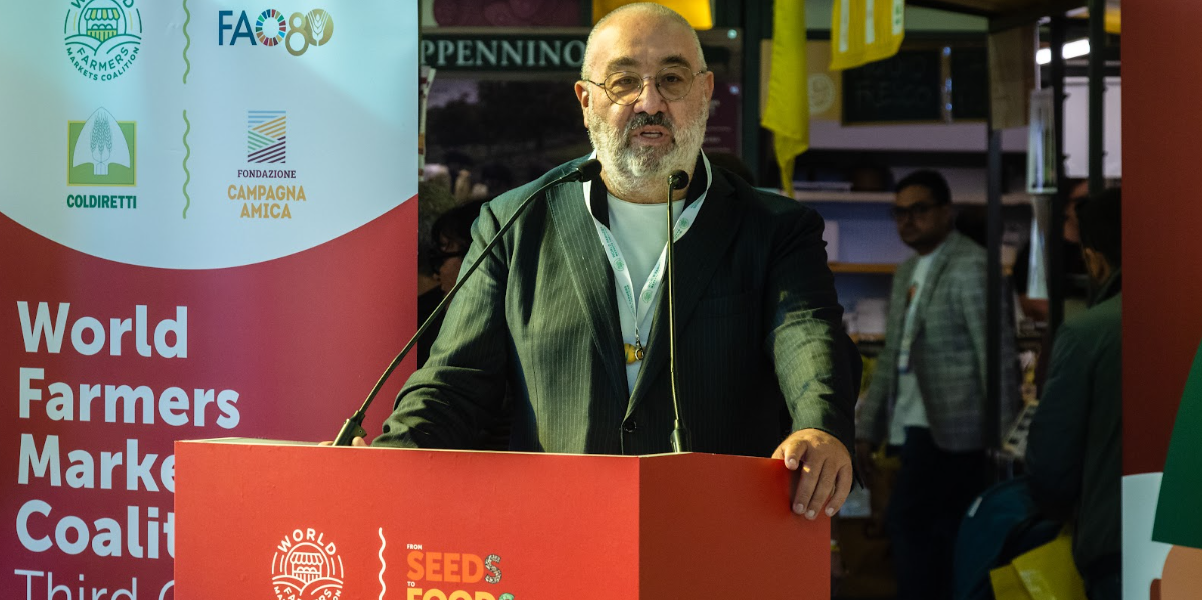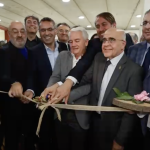Article by Carmelo Troccoli
The third General Assembly of the World Farmers Markets Coalition (WorldFMC) marked an important milestone in the organization’s journey, a true success achieved by everyone, for everyone. The event reflected the growing strength of the Coalition, the expansion of its global network, and a deeper shared awareness of its mission: to promote and protect local food systems around the world.
The Keys to Success
This year’s Assembly stood out for its record number of participants and for the sense of unity that animated all members. The discussions, exchanges, and commitments demonstrated that WorldFMC is not only expanding geographically but also consolidating its role as a credible and influential global actor in the field of local and sustainable food systems.
The global network of farmers markets continues to grow, with a nearly 40% increase recorded over the past year, bringing the total number of markets under the World Farmers Markets Coalition to 28,000. Today, the WorldFMC represents over 100 associations, 330,000 farming families, and more than 400 million consumers across more than 80 countries. These figures reflect both the dynamism of the coalition and the widespread recognition of farmers markets as key drivers of sustainable development, local economies, and community well-being.
Recognition from International Institutions
One of the highlights of the Assembly was the renewed recognition and collaboration from leading international institutions, FAO, IFAD, CIHEAM Bari, IILA, and ICCROM, each confirming their partnership and commitment to future joint projects.
- FAO reaffirmed its support for the continued growth and development of the Coalition.
- IFAD confirmed the launch of new projects in Africa, joined by CIHEAM Bari, which announced similar initiatives on the continent.
- IILA announced the opening of new projects in Latin America, extending WorldFMC’s reach across the globe.
- ICCROM launched the idea of collaborating with WorldFMC to promote the recognition of local food as part of humanity’s cultural heritage.
These partnerships strengthen the Coalition’s presence worldwide and reinforce its credibility within the international community.
Growing Credibility Among Cities
WorldFMC’s influence among cities continues to rise. This was clearly demonstrated by the strong participation of WorldFMC delegates, led by President Richard McCarthy, at the Milan Urban Food Policy Pact Global Forum 2025, a key event in the dialogue between local governments and food system actors. The Forum provided an important opportunity to highlight the vital role of farmers markets, their leaders, and local farmers in making cities more sustainable and better connected with the surrounding countryside.
At the same time, the Coalition’s active involvement in the World Food Forum further underlined its role as a leading organization advocating for local food, sustainable markets, and the empowerment of producers. At the Forum, our delegates amplified the voices of farmers and market managers, highlighting the importance of supporting small family farms, safeguarding their incomes, and recognizing their essential role in feeding the planet.
New Tools for Unity and Growth
The Third General Assembly also marked a turning point in strengthening internal cohesion and future-oriented initiatives.
Youth Alliance for Local Food
A central highlight of the Assembly was the launch of the Youth Alliance for Local Food, a global youth-led initiative connecting young producers, entrepreneurs, consumers, and activists working to advance fair, sustainable, and resilient local food systems.
The Alliance introduced a manifesto, developed by youth engaged in farmers markets and local food initiatives across continents. It is both a call to action and a blueprint for systemic change, positioning farmers markets at the center of food systems transformation and highlighting the vital role of young people as innovators, custodians of local biodiversity, and drivers of fair and resilient economies.
The manifesto builds on six core commitments: Local food, Good, Good local food connections, Fair food markets, Information and technology for good local food and Activism for good local food.
Through this Alliance, youth are amplifying their voices, sharing knowledge, and building global connections to reshape the future of food. What emerged is clear: farmers markets can nourish communities, protect the planet, and create fairer economies for all.
WorldFMC Awards
The Assembly also celebrated the WorldFMC Awards, highlighting farmers, market managers, and cities who embody the values of local food systems: biodiversity, community resilience, short supply chains, environmental regeneration, and equitable access to fresh, nutritious food.
This year’s winners tell a powerful story of local action inspiring global change. In the mountains of Peru, a mother of five demonstrates how agroecology can feed families and nurture hope. In Nairobi, a market manager is transforming local food systems into engines of social change. In Rome, public policy is turning local markets into a cornerstone of urban sustainability.
Together, they remind us that farmers markets are more than just places to buy food, they are spaces where communities are built, biodiversity is protected, and economies are reimagined.
These steps confirm the Coalition’s evolution into a stronger, more structured, and more unified organization.
Policy and Position Papers
As part of strengthening its advocacy and strategic direction, WorldFMC developed and advanced two key position papers reflecting its collective vision and priorities:
- “Farmers Markets: Protecting Life Through Daily Exchanges That Connect People, Products, and Planet”
- “Urban Food Policy: Farmers Markets as Drivers for Local Food Systems”
The first paper calls for a clear and shared definition of farmers markets, underscoring their unique role as spaces where producers and consumers meet directly. Farmers markets are not just places of trade, they are cultural and social hubs, spaces of biodiversity preservation, and catalysts for local economic and environmental resilience. A shared definition is essential for implementing supportive policies at local, national, and international levels.
The second paper highlights how urban food policies can leverage farmers markets to build sustainable, inclusive, and resilient local food systems. Farmers markets act as bridges between rural and urban communities, ensuring fair income for farmers, improving access to fresh and nutritious food, and strengthening community ties. By integrating farmers markets into urban planning and policy frameworks, cities can more effectively address challenges like food insecurity, social isolation, and environmental degradation.
Together, these position papers reaffirm WorldFMC’s commitment to making farmers markets strategic allies in shaping fairer, healthier, and more sustainable food systems worldwide.
Looking Ahead
WorldFMC emerges from its third General Assembly stronger than ever, united by shared purpose and inspired by common goals. Reflecting this new phase of maturity and global reach, the Coalition announced that beginning next year, the General Assembly will travel the world, symbolizing WorldFMC’s international dimension and inclusive spirit.
The next destination will be announced soon.
For now, the message is clear: we move forward together, stronger than ever.






